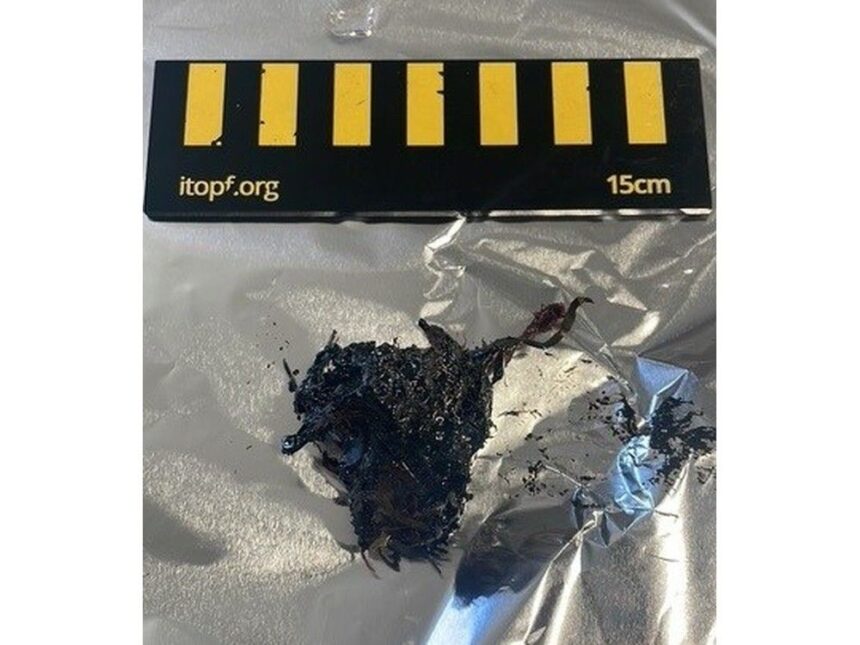While it’s nearly certain tar balls found in the area have come from the grounded MSC Baltic III, an underwater inspection shows no consistent leak of contaminants from the cargo ship in Cedar Cove, NLAuthor of the article: Gary Kean • The TelegramPublished Apr 18, 2025 • Last updated 12 hours ago • 4 minute readThis tar ball, measuring roughly seven centimetres across, was one of the ones found on the beach at Cedar Cove, near the wreck of the MSC Baltic III cargo ship that has been grounded at the site since Feb. 15, 2025. Photo by Eastern Canada Response CorporationIt’s all but certain that tar balls found nearby came from the MSC Baltic III, but the Canadian Coast Guard says there’s still no sign of any persistent pollution coming from the wrecked ship.The 22,000-tonne cargo ship has been grounded on the rocky shoreline of Cedar Cove in western Newfoundland since it lost power as it prepared to enter the Bay of Islands during a raging blizzard on Feb. 15, 2025.THIS CONTENT IS RESERVED FOR SUBSCRIBERS ONLY.Subscribe now to access this story and more:Unlimited access to the website and appExclusive access to premium content, newsletters and podcastsFull access to the e-Edition app, an electronic replica of the print edition that you can share, download and comment onEnjoy insights and behind-the-scenes analysis from our award-winning journalistsSupport local journalists and the next generation of journalistsSUBSCRIBE TO UNLOCK MORE ARTICLES.Subscribe or sign in to your account to continue your reading experience.Unlimited access to the website and appExclusive access to premium content, newsletters and podcastsFull access to the e-Edition app, an electronic replica of the print edition that you can share, download and comment onEnjoy insights and behind-the-scenes analysis from our award-winning journalistsSupport local journalists and the next generation of journalistsRegister to unlock more articles.Create an account or sign in to continue your reading experience.Access additional stories every monthShare your thoughts and join the conversation in our commenting communityGet email updates from your favourite authorsSign In or Create an AccountorArticle contentThe hull of the ship has been damaged and the vessel cannot be refloated. A salvage team hired by the ship’s owners, the Mediterranean Shipping Company, has been busy assessing the ship’s condition and attempting to remove any potential pollutants.Likely heavy fuelThere had been no sign of pollution until three tar balls were found on the beach at Cedar Cove recently, which the Canadian Coast Guard confirmed on April 14.In an interview on Thursday, April 17, the Coast Guard’s senior response officer of the Marine Environmental and Hazards Response Section confirmed there have now been a total of six tar balls found since the initial one was located on April 11. Bruce English is the senior response officer of the Marine Environmental and Hazards Response section of the Canadian Coast Guard. Photo by Gary Kean/The Telegram“It’s 99 per cent (chance) it came from the vessel, but they’re analyzing it just to see what type it is and if it’s from one of the different tanks (that are part of the ship),” said Bruce English, who said the substance does appear to be heavy fuel.The salvage crew sent an ROV to conduct an underwater survey of the ship’s damaged hull again on April 13.Article content“There were no signs of oil being released anywhere, so it’s not a continuous release out through a particular crack or something like that,” explained English.While the initial reports from the Coast Guard indicated the tarry globs were the size of tennis balls, English said they were more like six golf balls from what he has seen. The MSC Baltic III has been aground on the rocky Cedar Cove shoreline since Feb. 15, 2025. Photo by Gary Kean/The TelegramWeather a factorWhile there has been some speculation that the substance may have found its way into the water through the fuel pumping process, English said that’s not the case.No fuel has been pumped over the side of the ship to the barge yet and has only been pumped from inside the ship to the frac tanks — which are temporary storage tanks — that have been placed on the deck.English can’t confirm, but does suspect, that some harsh weather conditions recently may have contributed to some substances being flushed out from the damaged ship.“There has been some heavy weather in the area and we might be getting some sea action coming in and out of a crack on the bottom of the vessel,” he said, noting the ship’s owner and salvage crew have committed to conducting further inspections.Article content Nearly half of the grounded MSC Baltic III’s cargo containers are empty. Photo by Canadian Coast GuardWhat’s removed, what’s notSo far, all eight containers of polymer beads have been removed from the ship.The beads are considered dangerous goods because they would be difficult to clean up if released into the local environment and could pose a hazard to marine life.There are still an estimated 1,600 metric tonnes of hydrocarbons, including heavy fuel and oils, that must be removed.Around 184 cubic metres of fuel have been pumped into the frac tanks placed on the ship’s deck by the salvage crews. However, none of that fuel has been removed from the ship yet.When conditions allow, the plan is to pump fuel and oils from the frac tanks into other frac tanks on a barge for transport away from the site.The ship was carrying around 470 containers when it ran aground, although half of those were empty. Salvage operations will shift to removing the containers once all potential pollutants have been removed. The Canadian Coast Guard continues to closely monitor ongoing salvage operations of the MSC Baltic III in Cedar Cove in western Newfoundland. Gary Kean/The TelegramRoad workEnglish had no further information on progress towards fixing up an existing all-terrain vehicle road leading from nearby Lark Harbour out to Cedar Cove so the potential pollutants and cargo could be removed by land, rather than remaining at the mercy of whether the sea conditions pf the day allow operations to proceed or not.Article contentThat plan would entail extending the road into the water, out to the bow of the MSC Baltic III, so that large trucks could pull up alongside and take on the substances being offloaded.English said any further updates on the road project would have to come from MSC, which has not yet responded to The Telegram’s inquiries about an update on its operations.English did say some work is going to be done on another, shorter road that leads from nearby Little Port to Cedar Cove. However, he said, this road would not be used by heavy trucks. Rather, it would be used by the salvage crews to make it easier for them to access the beach area to bring out response and prevention equipment.Recommended from Editorial Troubling find: Tar balls found on NL beach near MSC Baltic III shipwreck View from the sea: Closer look at cargo ship that ran aground in a ‘lucky’ spot in NL English said he understands everyone is anxious to see the threat of pollution and eventually the ship itself removed, but said this effort is going to take a long time and is still at the mercy of the forces of nature.“The Coast Guard is still on site, working with the salvage company to ensure the contaminants are removed from the vessel in a timely manner, but not too expeditiously,” said English.“We want to make sure protection of the environment is more important than doing something hastily and making a mess or something.”Article content
Clumps of concern: Number of tar balls found near western NL shipwreck now at half a dozen











